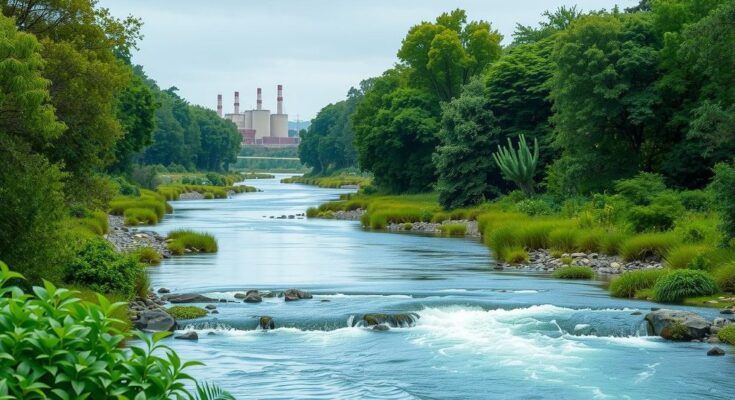Rogelio Frigerio and Yamandú Orsi discussed avoiding conflicts over a green hydrogen plant in Paysandú during their meeting in Montevideo. They highlighted the importance of dialogue and cooperation to prevent tensions, specifically reflecting on past issues related to the Botnia pulp mill. They also explored additional regional projects aimed at enhancing trade and economic integration between Argentina and Uruguay.
In a recent meeting, Rogelio Frigerio, governor of Entre Ríos, and Yamandú Orsi, president of Uruguay, emphasized the importance of avoiding conflicts regarding the installation of a green hydrogen plant in Paysandú. They both agreed to foster dialogue to ensure that differences do not escalate, particularly drawing lessons from past diplomatic crises between their nations. Frigerio remarked that, “The Uruguay River unites us, it doesn’t separate us,” underscoring the shared interests of both countries.
The discussions, held in Montevideo, focused primarily on the HIF Global plant proposed for the eastern bank of the Uruguay River, which is opposite the city of Colón in Entre Ríos. Concerns about the environmental impact on tourism—a key economic sector—were raised by the Colón community. Frigerio acknowledged these concerns, stating that there should be no competition between the green hydrogen project and the local tourism industry. In response, Orsi committed to engaging in discussions with all stakeholders involved.
Furthermore, Uruguayan Foreign Minister Mario Lubetkin highlighted the necessity of maintaining a cooperative stance to manage the projects involving the Uruguay River. He pointedly remarked, “Let what happened with the bridges never happen again,” referring to the past blockades that affected border crossings due to the Botnia pulp mill conflict. Both nations agreed to uphold standards of complementarity and sustainability in the plant’s development.
Besides addressing the green hydrogen plant, Frigerio and Orsi identified other strategic regional projects to advance, including dredging the Uruguay River to improve navigability and planning a deep-water port in Soriano. These initiatives aim to enhance regional trade and economic integration, benefiting Paraguay, northern Argentina, and the Uruguayan coast. Lubetkin concluded by affirming a commitment to dynamism and collaboration to ensure that fears do not stifle ongoing work or economic development.
The meeting between the leaders of Argentina and Uruguay highlights a commitment to avoiding past conflicts surrounding environmental projects, emphasizing cooperation and dialogue. The concerns of the Colón community regarding the green hydrogen plant were acknowledged, and a variety of strategic initiatives were set to benefit the wider region. As both countries move forward, their focus on sustainable development and economic integration is poised to foster better relations and mutual prosperity.
Original Source: hydrogen-central.com




